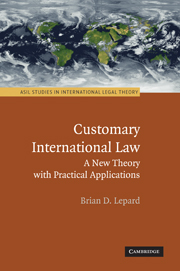Book contents
- Frontmatter
- Contents
- Figures
- Acknowledgments
- Cases
- PART ONE THE ENIGMAS OF CUSTOMARY INTERNATIONAL LAW
- PART TWO FOUNDATIONS OF A NEW THEORY OF CUSTOMARY INTERNATIONAL LAW
- PART THREE RESOLVING THE CONCEPTUAL ENIGMAS OF CUSTOMARY INTERNATIONAL LAW
- PART FOUR RESOLVING THE PRACTICAL ENIGMAS OF CUSTOMARY INTERNATIONAL LAW
- 12 General Sources of Evidence of Opinio Juris
- 13 The Role of Treaties as Evidence of Opinio Juris
- 14 The Role of United Nations General Assembly Resolutions as Evidence of Opinio Juris
- 15 The Role of Consistent State Practice
- 16 The Persistent Objector Exception
- 17 Defining Jus Cogens Customary Norms
- 18 Defining Erga Omnes Customary Norms
- 19 Resolving Conflicts with Treaties
- 20 Changing Customary International Law and the Role of International Organizations
- PART FIVE SOME APPLICATIONS OF THE THEORY
- PART SIX THE FUTURE OF CUSTOMARY INTERNATIONAL LAW
- Bibliography
- Index
16 - The Persistent Objector Exception
Published online by Cambridge University Press: 05 June 2012
- Frontmatter
- Contents
- Figures
- Acknowledgments
- Cases
- PART ONE THE ENIGMAS OF CUSTOMARY INTERNATIONAL LAW
- PART TWO FOUNDATIONS OF A NEW THEORY OF CUSTOMARY INTERNATIONAL LAW
- PART THREE RESOLVING THE CONCEPTUAL ENIGMAS OF CUSTOMARY INTERNATIONAL LAW
- PART FOUR RESOLVING THE PRACTICAL ENIGMAS OF CUSTOMARY INTERNATIONAL LAW
- 12 General Sources of Evidence of Opinio Juris
- 13 The Role of Treaties as Evidence of Opinio Juris
- 14 The Role of United Nations General Assembly Resolutions as Evidence of Opinio Juris
- 15 The Role of Consistent State Practice
- 16 The Persistent Objector Exception
- 17 Defining Jus Cogens Customary Norms
- 18 Defining Erga Omnes Customary Norms
- 19 Resolving Conflicts with Treaties
- 20 Changing Customary International Law and the Role of International Organizations
- PART FIVE SOME APPLICATIONS OF THE THEORY
- PART SIX THE FUTURE OF CUSTOMARY INTERNATIONAL LAW
- Bibliography
- Index
Summary
RECOGNITION OF THE PERSISTENT OBJECTOR EXCEPTION
We have already seen that according to the persistent objector exception, a state that has consistently rejected a rule of customary international law is not bound by it. Should this doctrine be recognized under the new definition of customary international law advanced here?
Contrary to the arguments of certain scholars such as Charney, this doctrine, with certain caveats, should continue to be recognized. One reason is that although customary international law is supported by the existence of a global community of states, which justifies in general obligating members of that community to comply with rules to which they have not explicitly assented, it is also supported by the fundamental ethical principles of significant state autonomy and unity in diversity. Because of the value attached by fundamental ethical principles to the overall freedom of action of states and respect for diversity, if a state so strongly believes that an emerging rule of customary law is not desirable to recognize that it repeatedly objects to it, the value of respecting that state's wishes should often – but not always – be considered to outweigh the community values that would be served by obligating the state to adhere to the rule.
Another reason to uphold the persistent objector doctrine is that despite the paucity of practice of its invocation it has become generally accepted as one of the secondary rules of customary law formation.
- Type
- Chapter
- Information
- Customary International LawA New Theory with Practical Applications, pp. 229 - 242Publisher: Cambridge University PressPrint publication year: 2010



